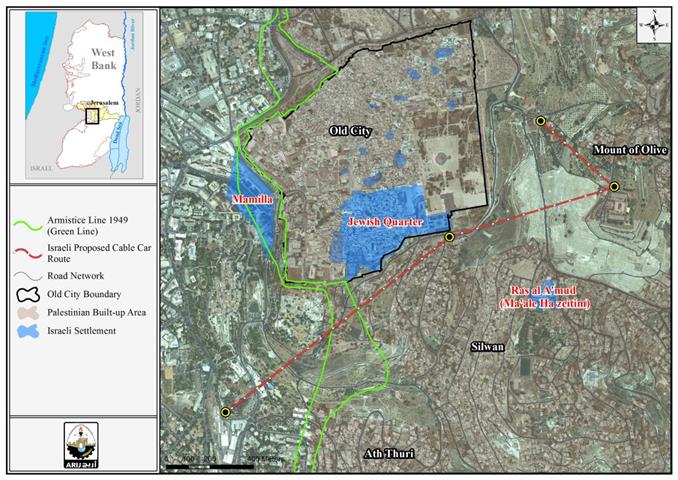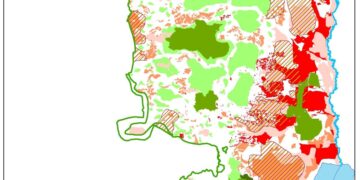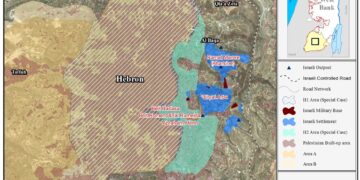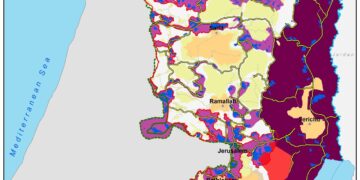On the 16th of February 2016, the Israeli newspaper “Haaretz” revealed that the so called “Jerusalem Development Authority” and the “Israeli Municipality of Jerusalem” revived the project to establish “cable car” in Jerusalem city. Noted that the cable care system it’s not a new project, where the first time the Israeli Authorities revealed the plan was in the year of 2013, where they hired a French company named “SAFEGE”, but after two years of involvement in the project during the feasibility-study stage, the French company decided to forgo any further participation for political reasons. [1]
Nowadays, the Israeli Authorities hired a new French company (CNA) specializing in the construction of cable cars.
According to the plan, the cable care is expected to pass near sensitive sites, including the Old City and Al Aqsa mosque. The plan is to have the car running through four stations: near the Old Train Station at the northern end of Emek Refaim Street in the German Colony neighborhood, outside the Old City by the Dung Gate, and near the Seven Arches Hotel on the Mount of Olives, and at the Garden of Gethsemane. The cost of the project is estimated as NIS 125 million ($31 million), and the length of the cable care is about 2.5 km. The cable-car system will transport tourists and visitors (an average of 6000 an hour) to and from the so-called Western Wall (Al-Buraq Wall).
It’s worth pointed that the construction of the cable car will need towers to be installed on the ground to carry it, and for that, the Israeli Authorities will need to confiscate Palestinian land, or uproot trees or demolish houses, to make a space for these towers. Without doubt, Israel will use and direct the tourist trips to the western wall and the surrounding areas for the interest of its own in an attempt to reshape a new historic stories about the city.
Israel move forward to change the status in the eastern part of Jerusalem city
After the Israeli occupation of the Palestinian territory in the year 1967, the Israeli Authorities worked day and night to change the status of Jerusalem city, and to Judaize it, by construction the Israeli settlements and outpost, occupying and confiscating Palestinian land to benefit the Israeli settlers, and the constructing of the segregation wall, which it surrounded the city of Jerusalem.
For that, and just during the months of January and February of 2016, the Israeli Authorities worked in two colonial projects in Jerusalem city:
The first project: “the new path of the light rail” which it will links between the Israeli settlement of Gilo, south of Jerusalem city with the Israeli settlement of Ramot, north of Jerusalem city.[2] And the second project: “new bypass road section and a road interchange that will link the Israeli so-called “Begin Road” or the Israeli bypass Road number 4 with the Israeli bypass road No. 60 (the section locally known to the Palestinians as the Bethlehem-Jerusalem road).[3]
The Israeli step to renew the cable car project that will cross the Green line (Armistice line 1949), is just one step toward the “Greater Jerusalem”, where the city of Jerusalem dominated by Jews geopolitically and demographically.
To sum up:
Obviously, the Israeli Government proves that it is no longer interested to reach just and durable peace agreement with the Palestinian based on two state solution. Moreover ,the systematic steps taken by the Israeli government mainly aim to resolve the situation on the ground in the oPt and in the Eastern part of the city of Jerusalem in particular.
The Israeli colonial plans in the oPt constitute a grave breach for the signed agreements as well as the international law rules and conventions:
- Article XXXI of the 1995 Oslo agreement Israel is forbidden from building or planning to any project or settlements or any colonial expansion or any plan that lead to change the status of the West Bank and Gaza Strip. The article provides “Neither side shall initiate or take any step that will change the status of the West Bank and the Gaza Strip pending the outcome of the permanent status negotiations”.
- Articles 147 of the Fourth Geneva Convention indicated that: Extensive destruction and appropriation of property not justified by military necessity and carried out unlawfully and wantonly. is a grave breach of the Convention.
- Art. 23 of the Hague Convention of 1907 also provides: In addition to the prohibitions provided by special Conventions, it is especially forbidden to destroy or seize the enemy's property, unless such destruction or seizure be imperatively demanded by the necessities of war;.
- Article 53 of the same convention provides that 'any destruction by the Occupying power of real or personal property belonging individually or collectively to private persons, or to the State, or other public authorities or social or cooperative organizations is prohibited, except where such destruction is rendered absolutely necessary by military operations.'
- Article 147 of the convention considers 'extensive destruction and appropriate of property, not justified by military necessity and carried out unlawfully and wantonly' as a grave breach of the Convention and thus constitute a war crime.
[1] http://www.jpost.com/Arab-Israeli-Conflict/French-company-quits-Jerusalem-cable-car-project-395127
[2] https://poica.org/details.php?Article=8908
[3] https://poica.org/details.php?Article=9031
Prepared by:
The Applied Research Institute – Jerusalem














